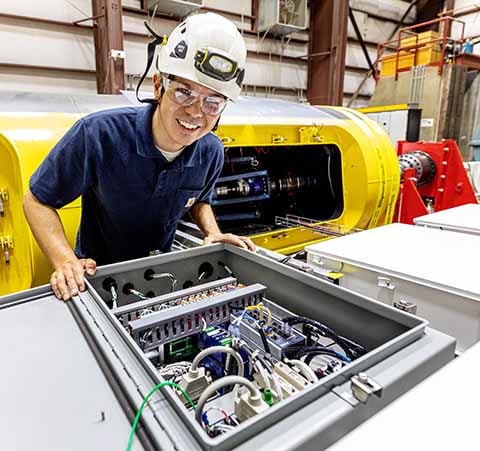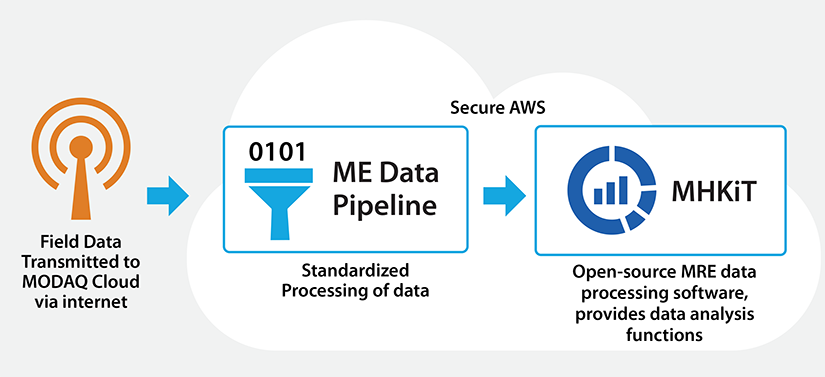Open-Water Testing Support
NLR's open-water testing provides expertise and equipment that enables technology developers, test centers, and the research community to safely collect high-quality data in the field.
Capabilities range include resource assessment, site assessment, mechanical and electrical measurements, and, in partnership with Pacific Northwest National Laboratory, environmental characterization and monitoring.
Field Support
NLR's engineers and technicians are available to support all field R&D activities, including:
- Test design and planning
- Sensor, instrument, and data acquisition system selection, design, calibration, installation, qualification, operation, and repair
- Equipment operation (fork lifts, aerial lifts, cranes, etc.)
- Machining Logistics (national and international)
- Risk assessment and mitigation.
NLR's engineers and technicians receive extensive training and hands-on experience that ensures they are qualified, proficient, and safe. Training includes:
- Low- and medium-voltage electrical work (some are master electricians)
- Fall protection for high-angle and aerial work
- Offshore safety and survival
- Hoisting and rigging
- Machining
- Sensor installation and electromagnetic interference protection.
Sensors and Instrumentation
NLR has a large inventory of resources, electrical and mechanical sensors and instrumentation, and support equipment available to support laboratory and field testing. NLR actively maintains and calibrates these hardware to ensure they are mission ready.
In March 2022, NLR hosted the Marine Energy Data and Instrumentation Workshop, which brought together experts in marine energy data collection and instrumentation from academia, labs, and the industry to discuss recent and ongoing progress in the field as well as needs and challenges for the future.
Resource Measurement
- Acoustic Doppler profilers for current and wave measurement
- Acoustic Doppler velocimeters for high-resolution current measurement
- Wave rider buoys for wave measurement.
Mechanical Measurement
- GPS systems for navigation and motion measurement
- Inertial measurement units and inertial navigation systems for motion measurement in 6 degrees of freedom (several are survey grade)
- Accelerometers for vibration measurement
- Acoustic and cup anemometers for wind speed and direction
- Metstations for a broad range of meteorological and atmospheric measurements.
Electrical Measurement
- Power transducers and power-quality meters for power measurement and characterization
- Potential and current transducers for voltage and current measurement.
Support Equipment
- Sea floor landers (mounts)
- Acoustic releases and deck boxes
- Optical fiber termination and testing equipment.
Data Acquisition, Processing, and Management

NLR has developed a field data system called the Modular Ocean-source Data Acquisition (MODAQ) system and has several other National Instruments and Campbell-Scientific-based data acquisition systems and data loggers developed for special applications. With a range of data acquisition expertise and systems, NLR can provide solutions to support in-water technology RD&D of wave, tidal, and current systems; resource characterization; environmental monitoring; and component testing.
MODAQ is an open-source hardware and software data system that provides a complete data solution from field measurement to data product. Our goal is to support the advancement of the marine renewable energy technologies by providing a useful, comprehensive, robust, verified, standards-compliant, easily customizable, and seamlessly integrated instrumentation, measurement, data processing, and data storage solution.
MODAQ consists of three primary components that are designed to provide a flexible hardware and software framework: MODAQ Field, MODAQ Cloud, and MODAQ Web.
MODAQ Field
Using the National Instruments CompactRIO embedded control and acquisition system—as well as additional components as required, such as a WiFi/cellular/satellite modem or a web-based power management system—this system provides a high-quality and robust platform that meets the rigorous requirement of testing at International Electrotechnical Commission certification-level testing. MODAQ Field's modular hardware design allows modules to be swapped out so that it can be rapidly reconfigured to meet custom application requirements. Multiple MODAQ Field systems can be deployed and tightly synchronized via GPS timing.
MODAQ Field capabilities include:
- Modular hardware and software architecture
- Data acquisition
- Remote management
- Data quality control
- Data conversion and data processing
- System monitoring and alerts
- Compliant software modules
- Onboard control capabilities.
MODAQ Cloud

Hosted on the NLR Amazon Web Services Cloud, MODAQ Cloud is comprised of data storage, quality control, formatting, processing, and upload modules. Data is sent to MODAQ Cloud from MODAQ Field at user-defined intervals to ensure near real-time data availability and backup. Additional data needed for data processing is pulled from other online instrument repositories. When new data has been uploaded to MODAQ Cloud, data processing modules are initiated for power quality, power performance, mechanical loads, and motion, and safety/function data processing utilizes the Marine and Hydrokinetic Toolkit Python libraries. MODAQ Cloud sits behind a secure firewall that meets the U.S. Department of Energy and national security standards. Data access can be provided to external users so they can access data as they are collected with the high bandwidth provided by Amazon Web Services. Data rights can be set at the individual file level.
MODAQ Web

A web-based dashboard that displays key near real-time summarized data as charts, tables, and plots is built on contemporary web technologies that retrieve necessary data upon web calls. MODAQ Web was designed as an operational monitoring tool, in that it provides at-a-glance access to vital metrics in near real time. The front end is presented as a collection of widgets based on JavaScript libraries that allow for visualization of the data sets and basic controls to select parameters and time spans.
MODAQ Success Stories
In 2021, NLR's MODAQ team created a customized data acquisition system for C-Power's SeaRAY autonomous offshore power system. The fortified MODAQ included a supervisory control and data acquisition system. It can collect field data, send that information to the cloud, and connect to the web to provide C-Power with live updates on the device’s performance and the ability to control it from anywhere in the world. Marine energy developers can work with NLR's engineers to design their own customized MODAQ and capture high-quality field data to help monitor and improve their technology designs.
Starting in 2021, NLR worked with the University of Hawaii to design a custom MODAQ system to help refine their wave energy prototype, the Hawai'i Wave Surge Energy Converter. Their MODAQ was designed to support three different types of deployment—lab bench, wave tank, and open-ocean field testing—and to be safe and reliable to use in wet, sometimes harsh, saltwater conditions.
Marine energy developers can work with NLR's engineers to design their own customized MODAQ and capture high-quality field data to help monitor and improve their technology designs.
Contact
Share
Last Updated Jan. 15, 2026
